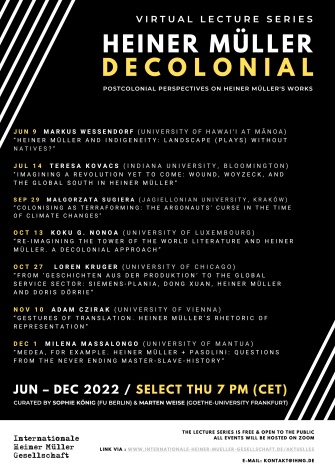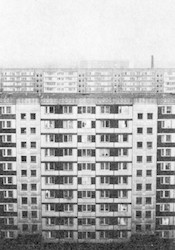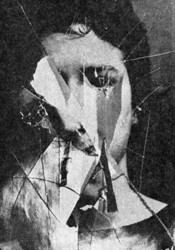HEINER MÜLLER DECOLONIAL: Postcolonial Perspectives on Heiner Müller's Works
Zoom link to the lecture series

Virtual Lecture Series
Curated by Sophie König (FU Berlin) & Marten Weise (Goethe University Frankfurt/Main)
Select Thursdays, 7:00 pm (Central European time) / 1:00 pm (North America Eastern time)
June 9: Markus Wessendorf (University of Hawaiʻi at Mānoa)
“Heiner Müller and Indigeneity: Landscape (Plays) Without Natives?”
Zoom-Meeting beitreten
https://us02web.zoom.us/j/88218443558?pwd=LubB3GqgW6V6MdzJBLj6hIH3fPjVL7.1
Meeting-ID: 815 9777 0342 Kenncode: 512620
July 14: Teresa Kovacs (Indiana University, Bloomington)
“Imagining a Revolution Yet to Come: Wound, Woyzeck, and the Global South in Heiner Müller”
September 29: Małgorzata Sugiera (Jagiellonian University, Kraków)
“Colonising As Terraforming: The Argonauts' Curse in the Time of Climate Changes”
October 13: Koku G. Nonoa (University of Luxembourg)
“Re-Imagining the Tower of World Literature and Heiner Müller. A Decolonial Approach”
October 27: Loren Kruger (University of Chicago)
“From ‘Geschichten aus der Produktion’ to the Global Service Sector: Siemens-Plania, Dong Xuan, Heiner Müller and Doris Dörrie”
November 10: Adam Czirak (University of Vienna)
“Gestures of Translation. Heiner Müller’s Rhetoric of Representation”
December 1: Milena Massalongo (University of Mantua)
“Medea, for Example. Heiner Müller + Pasolini: Questions from the Never-Ending Master-Slave-History”
Heiner Müller’s work must be discussed today against the background of increasingly widespread debates about literature written from the global North and from a Western Eurocentric perspective. This digital lecture series highlights the potentials but also the complicity of Müller’s writing with the guardians of order and tradition, with their use of language and instrumentalised role models. The lectures investigate how Müller’s complex work can be located in a world more aware of its post-colonial constitution than was the case almost 30 years ago. Müller himself was aware of the task and as late as December 1989 he stated: “What is decisive is that at last the speechless and the stones speak.” But regardless of the political ambition of solidarity with the oppressed of all countries, Müller’s work is part of a canon of intellectual history that separates it from those for whom it hopes to speak. This raises questions: Who speaks, who can speak, who is allowed to speak and what remains unsaid? Contributions from international and interdisciplinary Heiner Müller research shed new light on these problems and thus open up critical perspectives on well-known texts, which are worth considering in light of a changed theoretical landscape.
The Lecture Series is free & open to the public
All events will be hosted on Zoom



